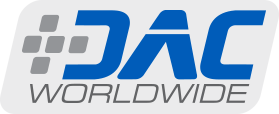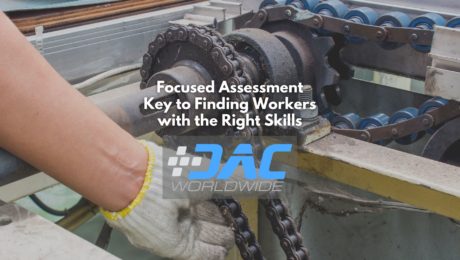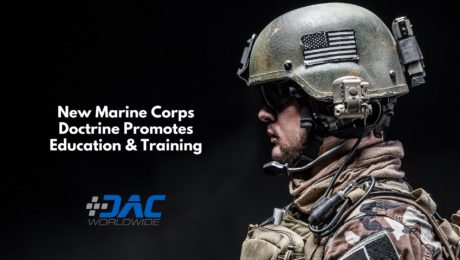Fundamental Electrical Skills Training: Powering the Path to Success
No matter their experience, skill level, or desired specialty, all individuals aspiring to become electrical professionals need the same fundamental electrical skills. These include understanding the basic principles of electricity and working with common electrical components, such as wiring, motors, and circuits. By mastering core skills like these, learners can help ensure they work safely and efficiently in whatever specified path they choose, whether that is industrial, commercial, or residential electrical careers.
As with any discipline, learning fundamental skills establishes a foundation from which a learner can build more complex concepts and skills. An electrician who now wires entire buildings for manufacturing processes was once a student learning about electric current. Furthermore, that same electrician could choose to expand their skills into more advanced or niche areas, such as performing industrial maintenance for the robotic arms they run power to, which would require that they rely on their understanding of basic PLC operation to progress to the complex coding needed to ensure manufacturing level precision.
Additionally, an electrical technician’s understanding of basic concepts and their abilities helps build confidence that translates to efficiency. For example, an HVAC technician is able to quickly restore air conditioning to a home because they understand how the circuit board, fan motor, compressor, and other components work both individually and together to create a working system. However, if the technician did not have a knowledge of wiring practices, the job would move much more slowly and, if done wrong, could even be dangerous.
In the same vein, industrial workers that know the do’s and don’ts of electrical practices can help recognize and prevent risky electrical setups. This makes a workplace safer for everyone and can help a company avoid downtime. In essence, fundamental electrical skills help prepare future technicians of many career paths to handle any job they will face in the field and provide the first step in pursuing a successful career in the electrical field.
DAC Worldwide’s Electrical Training Systems
DAC Worldwide offers many training systems that teach learners the fundamental electrical skills they need for a successful career. Each trainer is compact and sturdy, allowing for ease of relocation and longevity of use. By using these systems, learners will practice crucial hands-on skills related to focused electrical topics. Below, we’ve included a sampling of our most popular electrical trainers.
400-PAC – Modular Basic Electricity Training System Plus
The 400-PAC covers basic AC and DC electrical principles, including installation, operation, and troubleshooting for multiple applications. Learners can expect to gain a greater understanding of how electricity is used for power and control in industrial, commercial, and residential settings.
This trainer uses 43 activities to engage learners in lessons covering topics such as terminology, background theory, component examination and testing, circuit design, and more. A built-in circuit breaker, transformer, and internal power supply create working voltages of 24VAC/24VDC. This allows learners to gain hands-on experience with skills like calculating and regulating voltage in a circuit, operating a clipper circuit and full-wave bridge rectifier, loading dry cells, utilizing indicator lamps and toggle switches, and much more.
420-000 – 1-Phase Motor Control Training System with Manual Starter
The 420-000 is a single-topic trainer that allows learners to focus solely on navigating the operation, wiring, troubleshooting, and application of an industrial single-phase AC motor with a manual starter. With redundant safety systems provided and a keyed instructor power switch, learners can safely study individually or in small groups.
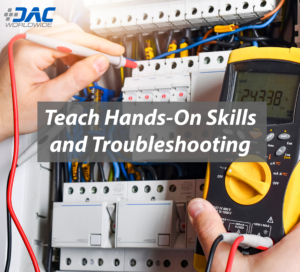 The system also comes equipped with a motor, manual motor starter, circuit breaker, electrical interlock, pilot light, e-stop switch, and four instructor fault switches. Learners use shielded banana-jack connections to wire the motor. While self-contained, the trainer may be expanded with supplemental components, such as a piloting switch module and a motor loading device, to teach additional topics.
The system also comes equipped with a motor, manual motor starter, circuit breaker, electrical interlock, pilot light, e-stop switch, and four instructor fault switches. Learners use shielded banana-jack connections to wire the motor. While self-contained, the trainer may be expanded with supplemental components, such as a piloting switch module and a motor loading device, to teach additional topics.
422-000 – 3-Phase Motor Control Training System with Manual Starter
Like the 420-000, the 422-000 is a self-contained, single-topic trainer that allows for independent or small group study. Multiple components, such as a keyed instructor power switch, permanent internal grounding, circuit breaker with lock-out/tag-out, and a large emergency stop switch, ensure learner safety. All equipped components are UL and CE certified.
This trainer offers 21 activities for learners to practice hands-on skills for operating, wiring, and troubleshooting an industrial three-phase AC motor with a manual starter. Some examples of these skills include wiring a three-pole pushbutton motor starter as a motor controller and employing the instructor fault switches to troubleshoot a drum-type reversing switch manual starter.
429E – AC Variable Frequency Drive Training System Plus
The 429E uses industrial-grade components, such as an industrial 3-phase motor and an Allen-Bradley PowerFlex 40 variable frequency drive, to teach AC drive programming, system troubleshooting, control wiring, and other industry-relevant skills. Various inputs and outputs and a programmable acceleration/deceleration with an on-board PID control loop allow learners further practice in understanding voltage, relay, resistance, and amperage.
Other course content includes topics like minimum and maximum frequency, jog parameters, skip frequency bandwidth, and checking and setting acceleration and deceleration timing. Eight fault insertion switches provide thorough real-time troubleshooting practice.
461-000 – Basic PLC Training System (AB Micro850)
The 461-000 provides a wealth of information for learners to develop a firm understanding of industrial PLCs, with emphasis on the current generation Allen-Bradley Micro850. This trainer features eight DC input switches, eight DC output LED lights, two 25-pin D-Sub input/output connectors, multiple safety components, and more. Eight fault insertion switches are also built into the system to help learners increase their proficiency with PLC troubleshooting.
An optional textbook offers more study for relevant topics, such as introducing Boolean algebra and Veitch diagrams, understanding logic gates, creating subroutines and sequencers, and much more. The trainer can also be expanded by connecting it to other training systems that teach process control, sensors, motor control, fluid power, and more.
Boost Your Electrical Training Program Today
We aim to make training more memorable and effective so future electrical technicians can thrive in their chosen career paths. For more information on which training aide may best fit your needs, contact a DAC Worldwide consultant today.
- Published in News
Focused Assessment Key to Finding Workers with the Right Skills
Click HERE to view Focused Assessment Key to Finding Workers with the Right Skills as a multimedia presentation.
“Now Hiring!”
These days, it seems like it doesn’t matter what type of business you’re in. If your business is open, then it probably has one of these signs in the window.
As industries across every sector continue to navigate the ups and downs of an uneven economic recovery in the wake of the ongoing COVID-19 pandemic, hiring managers are struggling to fill open positions.
Whether you’re an employer looking to fill critical roles or an instructor trying to prepare your students for available jobs, it’s important to understand that now, more than ever, workers need the right skills to be successful in the modern industrial workplace.
In this article, we’ll take a look at the issues employers face trying to find workers with the right skills. We’ll also explain the importance of focused assessment and how the training tools offered by DAC Worldwide can help employers and instructors assess and train workers for the jobs of today and tomorrow.
Why are there so many Open Manufacturing Jobs?
 The COVID-19 pandemic took a heavy toll on manufacturers. Combining fluctuating demand with quarantining workers and vast supply chain disruptions, many manufacturers struggled to weather the many storms they faced.
The COVID-19 pandemic took a heavy toll on manufacturers. Combining fluctuating demand with quarantining workers and vast supply chain disruptions, many manufacturers struggled to weather the many storms they faced.
Now that we’re in an extended period of uncertain recovery, things should be slowly getting better. After all, unemployed people do need jobs, right? Instead, manufacturers seem to be falling farther behind.
According to an article by Alexandra Johnson:
“The US manufacturing industry is forecast to grow 7% in 2021, yet with this anticipated growth, the industry is struggling to hire enough workers to meet demand. Before COVID, the situation was bad, but post-pandemic it has become even worse. Despite lockdown lifting, the industry is reporting over 515,000 jobs need filling, just to meet demand.”
Why are so many manufacturers having such a hard time filling their many open positions? Experts believe that a big part of the problem is that too many workers simply don’t possess the skills employers need.
Today’s manufacturing workplace isn’t the dirty, boring, repetitive assembly line some people erroneously imagine. Modern facilities feature cutting-edge technologies that require specialized skills that not enough workers seem to have these days.
How can Manufacturers find Workers with the Right Skills?
With so many open positions to fill, it might seem like manufacturers should simply hire anyone they can get their hands on and then train them to do the jobs they need done. This approach, however, isn’t advisable for a variety of reasons.
Primarily, manufacturers who are already struggling with a whole host of issues don’t have the bandwidth to babysit new workers while they acquire the training they need. Many manufacturers also don’t have either the personnel or the tools to effectively train new workers.
In an article in the Harvard Business Review, LinkedIn CEO Ryan Roslansky advocates for a new skills-based approach to hiring. Roslansky argues that a skills-based approach “is the future of hiring and development…At a time when talent is the number-one commodity in business, companies can’t afford to remain stuck in old mindsets.”
Roslansky urges employers to “[f]ocus on the results you’d like to see, rather than the type of qualifications that you think could deliver them. Highlighting the desired skills — the candidate’s ability to perform certain tasks — gets to the same results without creating an unnecessary barrier to entry, like a requirement for a four-year degree.”
In an article by Adina Miron, the author agrees:
“Skills-based hiring enables employers to hire for the skills gaps that exist within their organization. Rather than focusing on experience, education, or certifications, companies should focus on identifying candidates with the needed skills to fill open positions.”
Roslansky echoes these thoughts:
“Shifting to a skills-focused approach is a viable solution to an evolving workforce dilemma…Stay focused on skills — and the assessments that can measure them…there are plenty of ways to gauge a candidate’s ability to perform without relying on their education or experience as proxies.”
A Skills-Based Hiring Approach Requires Proper Assessment & Training Tools
 The nature of manufacturing makes generalized assessments and comprehensive training systems difficult to use in the context of hiring new workers. Why? The answer can be found in the concept of specialization of labor.
The nature of manufacturing makes generalized assessments and comprehensive training systems difficult to use in the context of hiring new workers. Why? The answer can be found in the concept of specialization of labor.
According to an article by Sampson Quain:
“Specialization of labor…refers to a process in business in which large tasks are divided into smaller tasks, and different employees or different groups of employees complete those tasks. Specialization is highly desirable in large-scale operations such as…manufacturing because it allows workers with specific skill sets to efficiently perform a specific task.”
For example, a manufacturer may need to hire someone with a specific skillset related to the operation, maintenance, troubleshooting, and repair of mechanical belt drives. A prospective candidate might claim to have general mechanical knowledge and skills, but how can the employer know whether the worker has the specific belt drive skills it needs?
To effectively use a skills-based hiring approach in manufacturing, employers need focused assessment and training tools that can be used to adequately determine a potential worker’s skills in a very specific area.
DAC Worldwide Offers Focused Assessment & Training Tools
Employers don’t need to recreate the wheel to move toward a skills-based approach to hiring. DAC Worldwide, an industry-leading manufacturer of technical assessment and training tools, offers a variety of solutions to the problems employers face.
In this section, we’ll take a closer look at several of DAC Worldwide’s focused assessment and training tools that employers can use to effectively and efficiently ensure that they’re hiring workers with the skills they need.
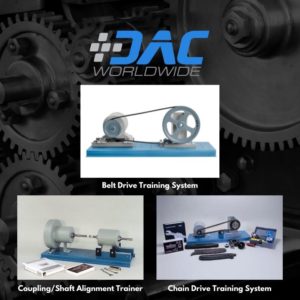 Belt Drive Training System (Model: 201-000)
Belt Drive Training System (Model: 201-000)
The Belt Drive Training System allows for convenient assessment and training in the identification, installation, tensioning, and alignment of common belt drives types found in industry. Featuring hardware for applications related to multiple matched belts, fractional horsepower belts, positive drive belts, and variable pitch sheaves, the system provides a variety of training and assessment applications in one benchtop piece of equipment.
Coupling/Shaft Alignment Trainer (Model: 208-000)
The Coupling/Shaft Alignment Trainer allows for realistic training and assessment in shaft alignment. Designed based on the dimensions of a common ANSI centrifugal pump, this trainer can assess and train workers on all common alignment techniques and tools. Training and assessment topics include using a dial indicator in coupling/shaft alignment, the reverse dial indicator method, fabrication of shaft keys, and installing a flexible disc coupling.
Chain Drive Training System (Model: 223-000)
The Chain Drive Training System allows for in-depth assessment and training in industrial chain drives, heavy/silent chains, and sprocket set usage. Using industry-standard components workers will encounter on the job, this training system provides a complete training and assessment experience covering topics such as taper lock bushings, chain drive maintenance, installation/alignment of chains, and tensioning of chains.
 Let DAC Worldwide Help You Fill Your Skills Gaps
Let DAC Worldwide Help You Fill Your Skills Gaps
The mechanical assessment and training tools highlighted above are just a few examples of the variety of technical training tools DAC Worldwide manufactures. In addition to training systems, DAC Worldwide also offers a wide range of industrial cutaways, detailed scale models, and sample boards featuring industrial components.
Contact a consultant with DAC Worldwide today to learn more about how their technical training tools can help you build the assessment and training program your company needs. Using DAC Worldwide training and assessment tools, you can transition to a skills-based hiring approach and fill the skills gaps in your organization!
- Published in News
New Marine Corps Doctrine Promotes Education & Training
Click here to view New Marine Corps Doctrine Promotes Education & Training as a multimedia presentation.
The few. The proud. Who are we talking about? The Marines, of course. That particular recruiting slogan has been permanently etched into our memories over the years.
And it’s a great slogan. The Marines are legendary for a training regimen that weeds out all but the strongest, creating a fighting force to be reckoned with. Indeed, the Marines have been on the front lines of every major U.S. military campaign of the modern era.
To be prepared for the future, however, the Marines know that training the same way they have in the past will not be sufficient. That’s why a recent doctrinal publication puts a new focus on education and continued learning.
Industry, always closely connected to the military, would do well to put a renewed emphasis on education and training, too. In this article, we’ll take a closer look at how partnering with a trusted technical training company like DAC Worldwide can prepare your students, workers, soldiers, and sailors for a bright future.
A New Doctrine for a New Era
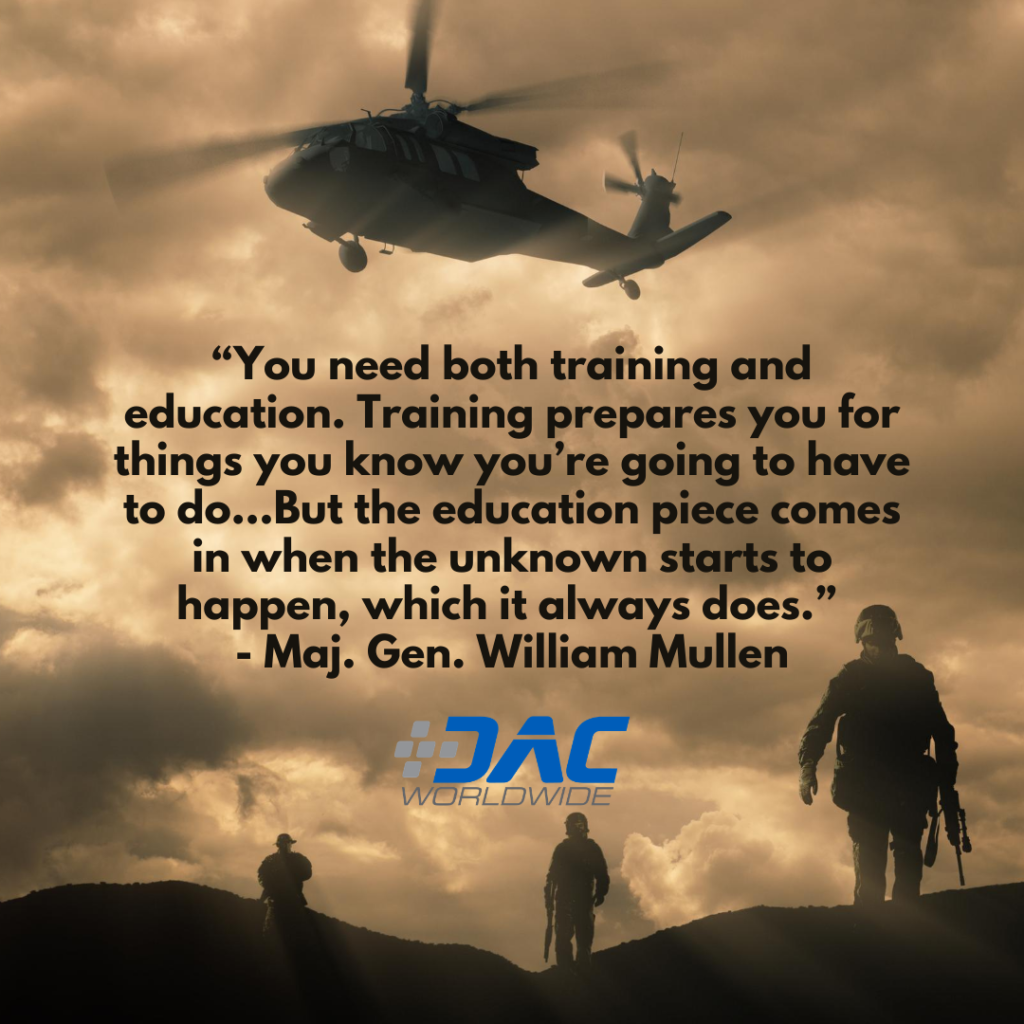 According to a Marine Corps Times article, “the Marine Corps unveiled the Marine Corps Doctrinal Publication 7 [MCDP 7] in February [2019] as the service aims to promote education, training, and continued learning among Marines so they become students of their profession.”
According to a Marine Corps Times article, “the Marine Corps unveiled the Marine Corps Doctrinal Publication 7 [MCDP 7] in February [2019] as the service aims to promote education, training, and continued learning among Marines so they become students of their profession.”
How significant was this doctrinal development? MCDP 7 was the first new doctrinal publication issued by the Marines since 2001. Its goal: “to motivate Marines to personally assess where they can improve and understand the ‘why’ behind the significance of learning.”
Maj. Gen. William Mullen was quoted as saying “that he’s heard Marines say they joined the service to escape an academic education. But the Corps wants its personnel to understand that the two complement one another and that education prepares Marines to think quickly when faced with challenges.”
According to Mullen, “You need both training and education. Training prepares you for things you know you’re going to have to do…But the education piece comes in when the unknown starts to happen, which it always does.” Mullen specifically referred to the fact that the environments Marines face today present challenges that are only growing more complex.
This new doctrinal change comes as “Commandant of the Marine Corps Gen. David Berger is working to remake the Corps to better compete with potential high-end adversaries…Berger wants a leaner force to conduct sea denial operations, survive in a contested maritime environment and serve as a larger Naval expeditionary force.”
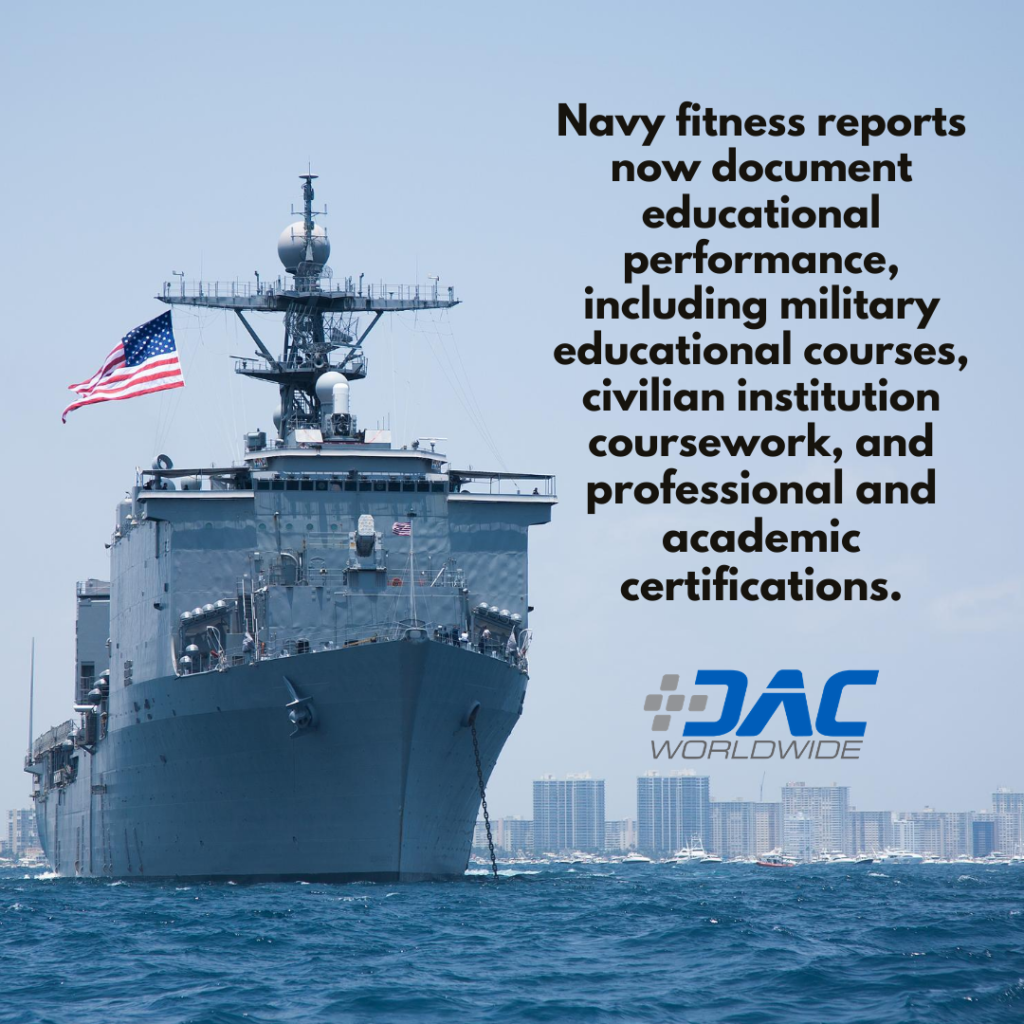 It’s Not Just the Marines
It’s Not Just the Marines
Speaking of the Navy, the Marine Corps Times article notes that the Navy announced in May 2019 “that it was modifying fitness reports to reflect an individual’s educational and training accomplishments, including military education courses, professional and academic certifications, among other things.”
Like the Marines’ new focus on education and continued learning, the Navy’s modified fitness reports are meant to “show that career-long military learning isn’t only job-related technical or tactical training, and that a commitment to higher education will produce Navy leaders with more refined critical thinking skills,” according to an article in the Navy Times.
Future Navy fitness reports will thus document educational performance, including “[m]ilitary educational courses, civilian institution coursework, and professional and academic certifications.” Navy leadership also indicated they will also encourage additional informal efforts, such as learning new technologies.
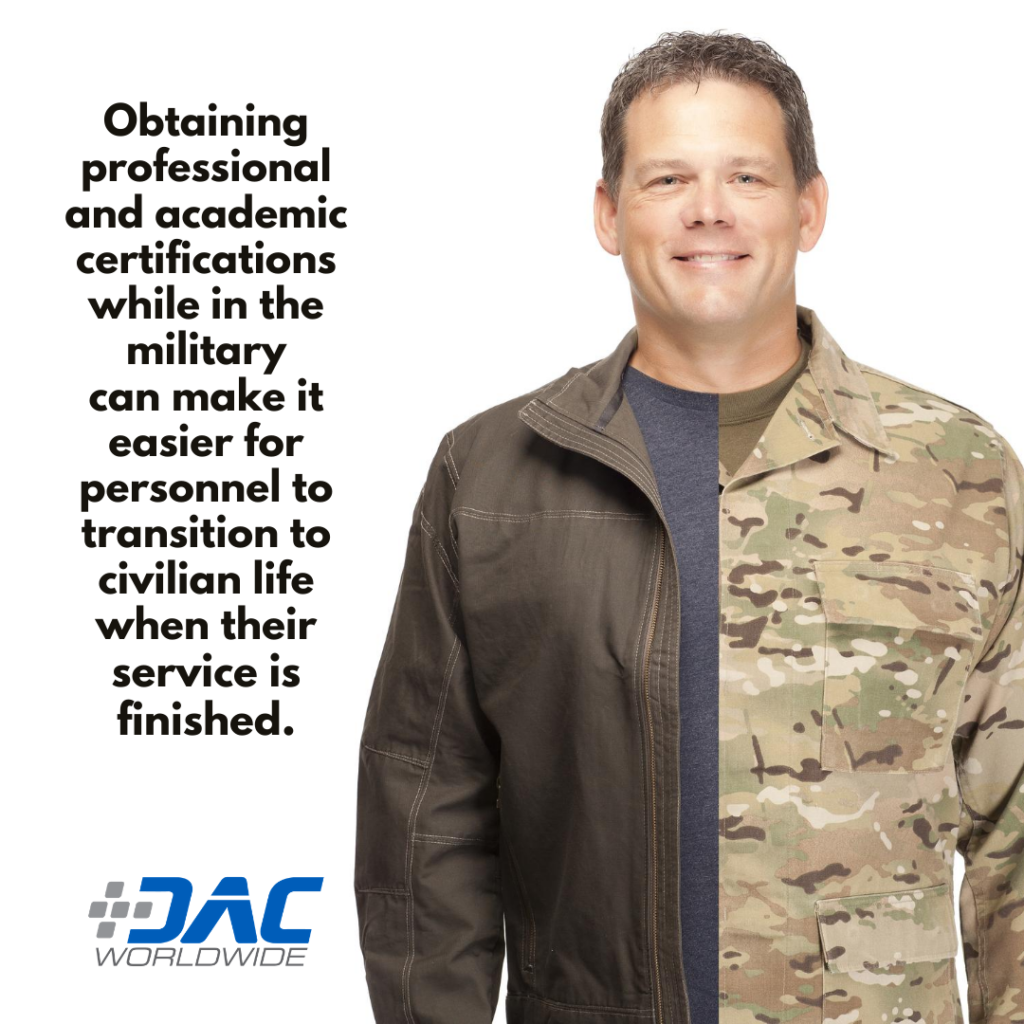 It’s All COOL
It’s All COOL
It’s no coincidence that the Marines and the Navy would emphasize professional and academic certifications. Much of the training that military personnel receive prepares them for future civilian jobs.
Obtaining professional and academic certifications while in the military can make it easier for personnel to transition to civilian life when their service is finished. All branches of the military recognize the importance of certifications in making that transition as easy as possible.
For example, the Marine Corps COOL site (Marine Corps Credentialing Opportunities On-Line) helps Marines see how their military training and experience matches up with civilian credential requirements. Such credentials could include important and valuable advanced manufacturing credentials from entities like the National Institute of Metalworking Skills (NIMS) and the Manufacturing Skill Standards Council (MSSC).
Marines using the COOL site can see whether military funding is available to help attain particular credentials. They can also see how the training and skills they’ve already acquired might match up with specific credentials valued by employers, such as NIMS’ Industrial Technology Maintenance (ITM) certification or MSSC’s Certified Production Technician (CPT) certification. There are also COOL sites for the Army, Coast Guard, Navy, and Air Force.
 Industry Must Also Evolve
Industry Must Also Evolve
Given the military’s new focus on education and continued learning, it’s important that industries that work with and support the military evolve in a similar fashion. The military-industrial complex consists of all sorts of industries that work closely with the military to help them accomplish their mission.
These industries should take a cue from their military counterparts and begin to develop a similar focus on education and continued learning among their workforce. Industry workers will only be able to continue to keep pace with their military counterparts if they’re also seeking new educational opportunities and learning new skills and technologies.
Pushing an industrial workforce or a military organization toward more education and greater skill development can be a daunting task. That’s why it’s imperative that both the military and their industrial counterparts seek out and rely upon the expertise of a trusted technical training partner.
A Trusted Education & Training Partner
DAC Worldwide is a US-based world leader in technical training solutions. For over 35 years, DAC Worldwide has been helping industrial employers and military organizations with realistic, hands-on training systems.
DAC Worldwide offers a wide range of product solutions to fit all your training needs. From training systems that teach a full range of skills to cutaways that increase understanding of how a component works, we have what you need.
For example, many military personnel work in the same skilled occupations as civilians. This means they need a solid foundation in various technologies, including electrical, electronics, fluid power, and mechanical drives.
Whether you train military personnel working on military bases or civilian crews with military contracts, DAC Worldwide’s military training solutions offer an unmatched range of products to allow you to create the course you need or to fill in any gaps that you have in your current training.
Let’s take a closer look at four specific DAC Worldwide products that can take your training program to the next level:
Lock-Out/Tag-Out Training System (811-000)
DAC Worldwide’s Lock-Out/Tag-Out Training System features a realistic, simulated working process environment that facilitates introductory training with hands-on activities related to the process of identifying and locking out sources of dangerous potential energy in an industrial setting. The training system includes two process tanks; a centrifugal pump; a complex, multi-purpose piping network; electrical controls; a variety of lockable system components; and a lock-out/tag-out kit that features a large number of commonly-encountered locking and tagging devices.
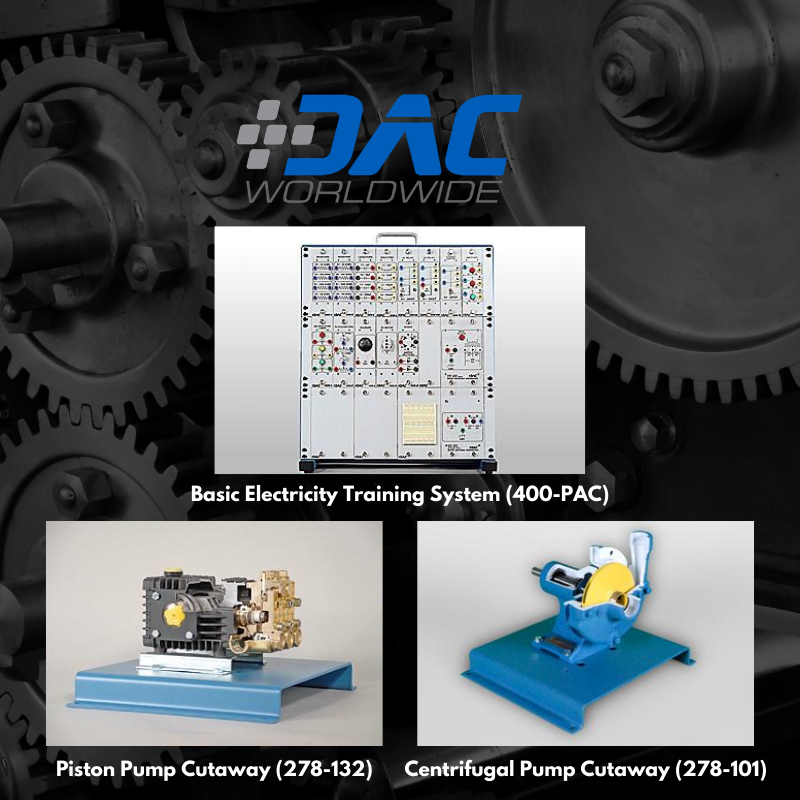 Basic Electricity Training System (400-PAC)
Basic Electricity Training System (400-PAC)
DAC Worldwide’s Basic Electricity Training System teaches basic AC and DC electrical principles. Learners will explore how electricity is used for power and control in various sectors. The trainer covers industry-relevant skills, such as installing, operating, and troubleshooting AC and DC electrical circuits in a variety of applications.
Piston Pump Cutaway (278-132)
DAC Worldwide’s Piston Pump Cutaway is an industrial piston pump that has been carefully sectioned and color-coded to train learners in the design, operation, construction, and maintenance of this common process pump used throughout industry. The cutaway exposes and showcases the complete internal configuration of an industrial piston pump. Moreover, seal features and bearings have been retained to allow realistic, hands-on pump maintenance and operation training.
Centrifugal Pump Cutaway (278-101)
DAC Worldwide’s Centrifugal Pump Cutaway is a sectioned centrifugal pump that provides realistic training in the operating principles, construction details, and maintenance of common centrifugal process pumps used throughout industry and the military. It includes various sectioned components, such as seals and bearings, as well as showcasing the pump’s impeller.
Contact DAC Worldwide Today
Is your organization ready to take its industrial technical training to the next level? Contact a DAC Worldwide expert today for a personal consultation regarding your training needs and how our variety of training systems, cutaways, dissectibles, and models can prepare both industrial workers and military personnel for the future challenges they face.

- Published in News

